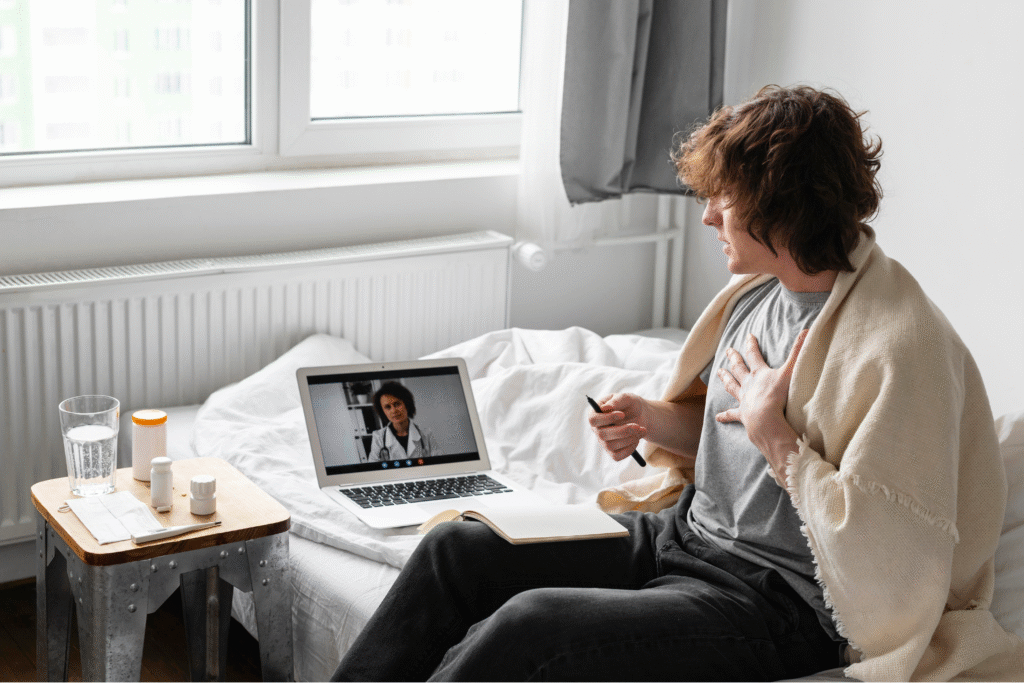Sleep deprivation and brain fog are common problems in today’s fast-paced lifestyle. These conditions reduce focus, memory, and productivity, affecting both personal and professional life.
Luckily, telehealth services in Florida provide accessible mental health care from the comfort of your home. By implementing practical telehealth tips to combat sleep deprivation and brain fog, you can restore mental clarity and improve overall wellness.

Table Of Content
- Introduction
- 1. What is Sleep Deprivation?
- 2. Understanding Brain Fog
- 3. How Telehealth Can Help
- 4. Top 5 Telehealth Tips to Combat Sleep Deprivation and Brain Fog
- 4.1. Improve Sleep Hygiene
- 4.2. Stress Management Through Teletherapy
- 4.3. Cognitive Behavioral Therapy for Insomnia (CBT-I)
- 4.4. Mindfulness and Relaxation Practices
- 4.5. Nutrition and Hydration Tips
- 5. When to Seek Professional Help
- 6. Conclusion
- FAQs
1. What is Sleep Deprivation?
Sleep deprivation occurs when the body does not get sufficient rest, usually 7–9 hours per night. Chronic sleep loss affects cognitive function, emotional well-being, and physical health.
Common causes include:
- Stress and anxiety.
- Irregular schedules or night shifts.
- Excessive screen time before bed.
- Medical conditions like sleep apnea.
Effects of sleep deprivation:
- Low energy and fatigue.
- Difficulty concentrating.
- Mood swings.
- Weakened immune system.

For more tips on improving sleep, visit the National Sleep Foundation.
2. Understanding Brain Fog
Brain fog is a mental state linked with sleep deprivation. It manifests as confusion, forgetfulness, and difficulty focusing.
Symptoms include:
- Trouble concentrating.
- Mental slowness.
- Forgetfulness.
- Feeling “spaced out”.

Chronic sleep deprivation and brain fog can reduce productivity and quality of life, but telehealth solutions can help.
3. How Telehealth Can Help
Telehealth offers convenient access to licensed professionals who can address sleep deprivation and brain fog through therapy, coaching, and personalized programs. Benefits include:
- Personalized support for sleep and mental clarity.
- Flexible appointments from home.
- Access to CBT-I and mindfulness programs.
- Regular guidance for lifestyle changes.
Explore telehealth services at Hope Clinic & Wellness for professional support.
4. Top 5 Telehealth Tips to Combat Sleep Deprivation and Brain Fog
4.1 Improve Sleep Hygiene
Sleep hygiene helps reduce brain fog and supports restorative rest:
- Maintain a consistent sleep schedule.
- Avoid screens at least one hour before bed.
- Keep the bedroom dark, quiet, and cool.
- Limit caffeine and alcohol in the evening.

Schedule a telehealth consultation for a personalized sleep plan.
4.2 Stress Management Through Teletherapy
Stress contributes heavily to sleep deprivation and brain fog. Teletherapy provides tools to manage stress effectively:
- Reduce anxiety through professional guidance.
- Learn mindfulness and breathing exercises.
- Receive consistent support without leaving home.

Check out our online anxiety therapy services.
4.3 Cognitive Behavioral Therapy for Insomnia (CBT-I)
CBT-I is proven to improve sleep and reduce brain fog. Benefits include:
- Better sleep quality.
- Fewer night awakenings.
- Increased daytime focus.
Telehealth provides CBT-I programs accessible from home.
4.4 Mindfulness and Relaxation Practices
Mindfulness can reduce stress and mental cloudiness associated with sleep deprivation and brain fog. Effective practices:
- Guided meditation via telehealth.
- Progressive muscle relaxation.
- Deep breathing exercises.
- Gentle yoga.

Learn guided exercises from Mayo Clinic Mindfulness Exercises.
4.5 Nutrition and Hydration Tips
A healthy diet and hydration improve focus, energy, and sleep quality:
- Drink water consistently throughout the day.
- Limit sugar and caffeine late in the day.
- Eat magnesium-rich foods (leafy greens, nuts).
- Include tryptophan-rich foods (turkey, eggs, dairy).

Consult a telehealth dietician for a personalized nutrition plan.
5. When to Seek Professional Help
Seek professional guidance if you experience:
- Chronic sleep deprivation.
- Persistent brain fog.
- Daytime fatigue affects daily life.
Telehealth services in Florida provide access to licensed mental health professionals for ongoing support.
Conclusion
Sleep deprivation and brain fog can negatively affect productivity, focus, and overall wellness. Following telehealth tips such as improved sleep hygiene, therapy, CBT-I, mindfulness, and nutrition can help restore mental clarity and energy.
Book a telehealth session with a licensed Florida mental health professional today to start improving your sleep and mental clarity.
FAQs
Can telehealth improve sleep quality?
Yes, telehealth provides access to CBT-I, mindfulness, and therapy sessions that help reduce sleep deprivation and brain fog and restore mental clarity.
How long does it take to see improvements?
Many patients notice improvements within 2–4 weeks of consistent sleep hygiene, teletherapy, and lifestyle practices.
Is telehealth covered by insurance in Florida?
Many insurance plans cover telehealth, especially for mental health services. Always confirm coverage with your provider.
Can telehealth help with chronic fatigue caused by sleep deprivation?
Yes. Telehealth professionals can assess underlying causes and provide personalized treatment plans to improve energy, focus, and productivity.
Are telehealth sessions as effective as in-person therapy?
Studies show telehealth is equally effective for CBT-I, anxiety therapy, and sleep management programs, offering flexibility and convenience.
Can children or teenagers benefit from telehealth for sleep issues?
Yes. Licensed mental health providers offer telehealth sessions tailored for children and teens to address sleep deprivation, stress, and focus problems safely and effectively.
What lifestyle changes are recommended alongside telehealth sessions?
Common recommendations include:
- Maintaining a consistent sleep schedule
- Limiting screen time before bed
- Practicing mindfulness or guided meditation
- Eating a balanced diet and staying hydrated
How can telehealth support mental clarity during work-from-home schedules?
Telehealth sessions can provide stress management techniques, focus exercises, and personalized sleep guidance to reduce brain fog and improve daily productivity.